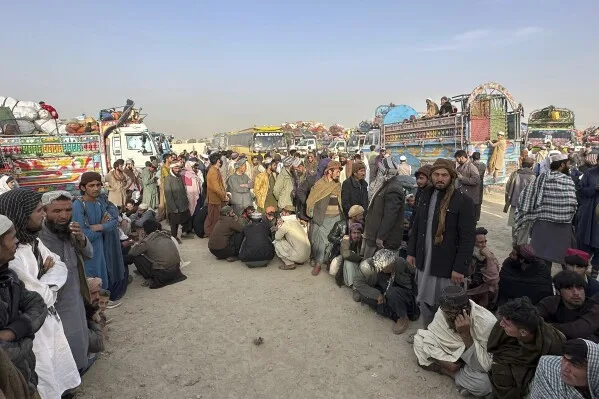Iran has expelled over 21,400 Afghan migrants who illegally entered the country, as revealed by Majid Shuja, the appointed commander of the border guards in Khorasan Razavi province, according to a report from Afghanistan-based Khaama Press. The deportations occurred over the past nine days, with the identified migrants handed over to the Taliban’s representative in the Dogharun district.
In the first half of 2023, a staggering 328,000 Afghan migrants have been deported from Iran, reports Khaama Press. This surge in deportations has raised concerns among Afghan refugees in Iran, who have experienced increased arrests, harassment by the police, and even forced deportations for those with official residency permits.
Taliban spokesperson Zabihullah Mujahid has urged neighboring countries, including Iran and Pakistan, not to forcibly deport Afghan refugees. He emphasized the importance of treating migrants with tolerance and avoiding illegal actions. However, despite these calls, both Pakistan and Iran have intensified their forced deportations of Afghan migrants.
Enayatullah Alokozay, a member of the defenders of Afghan refugees in Iran, highlighted the ongoing forced deportation, stating that the process is accelerating. Afghan refugee representatives in Iran have criticized the Iranian government and the international community for what they perceive as a lack of support, calling on them to address the challenges faced by Afghan refugees.
Spogmai Jabbarkhil, an Afghan refugees’ representative in Iran, expressed dissatisfaction with the Iranian government’s treatment of refugees, describing it as oppressive and poorly timed, particularly as winter approaches. Asefa Stanikzai, a refugee affairs analyst, pointed out the various challenges Afghan refugees face in Iran, including difficulties in the job market, housing, and the lack of identity documents.
Meanwhile, Pakistan’s interim government has also taken a harsh stance, initiating the forceful deportation of over 220,000 Afghan migrants since November 1. The situation has left Afghan refugees anxious about returning to Afghanistan, further exacerbating the challenges faced by this vulnerable population.
Why Both Pakistan & Iran are so Hard Towards Taliban
In a recent development, Iran has followed in Pakistan’s footsteps by expelling Afghan migrants, signaling a concerted effort to exert pressure on the Taliban to reconsider their treatment of Afghan refugees. This move comes amidst growing concerns over the treatment of Afghan migrants in both neighboring countries and the increasing strain on relations between the governments involved.
Over the past nine days, Iranian authorities, under the command of Majid Shuja, the Taliban-appointed border guards commander in Khorasan Razavi province, have deported more than 21,400 Afghan migrants who entered the country illegally. This action mirrors Pakistan’s decision to forcefully deport over 220,000 Afghan migrants since November 1, creating a regional trend that reflects a coordinated strategy to address the challenges posed by the influx of Afghan refugees.
The cumulative effect of these deportations appears to be an attempt to build pressure on the Taliban-led government in Afghanistan, urging them to reassess their approach to Afghan refugees. The increased expulsions underscore a shared frustration among regional powers with the Taliban’s handling of the refugee crisis and a desire for a more cooperative and humane approach.
Taliban spokesperson Zabihullah Mujahid has responded to these developments by calling on neighboring countries, including Iran and Pakistan, to refrain from forcibly deporting Afghan refugees. Mujahid emphasized the need for tolerance and legal treatment of migrants, urging the international community to play a constructive role in addressing the challenges faced by Afghan refugees.
The decision to expel Afghan migrants from both Iran and Pakistan may be a strategic move to push the Taliban to adopt more considerate policies towards the refugee population. The timing of these actions, with winter approaching, adds urgency to the need for a comprehensive and compassionate resolution to the refugee crisis.
Afghan refugee representatives in Iran have voiced their dissatisfaction with the Iranian government’s handling of the situation, citing oppression and a lack of support. Spogmai Jabbarkhil, a representative, criticized the timing of the deportations, stating that Iran is pushing out refugees ahead of winter, when it is least conducive.
The escalating situation highlights the complex dynamics surrounding the treatment of Afghan refugees in the region. As Iran and Pakistan take bold steps to address the issue, it remains to be seen how the Taliban will respond and whether these actions will lead to a more cooperative and humanitarian approach to managing the challenges posed by the Afghan refugee crisis. The international community, too, has a crucial role to play in facilitating dialogue and finding sustainable solutions for the well-being of Afghan refugees in the region.


